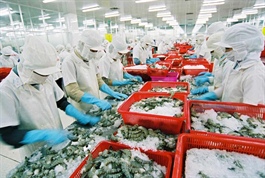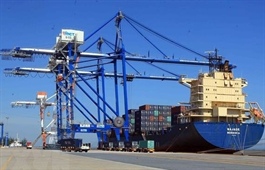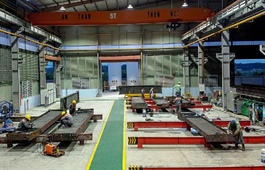VN firms struggle as China lockdowns disrupt supply chains
VN firms struggle as China lockdowns disrupt supply chains
Vietnamese businesses are finding it difficult to cope with supply chain breakages as a result of China enforcing strict COVID-19 lockdown policies to curb recent outbreaks.

This has significantly affected raw material supply and exports because China usually supplies a large quantity of materials used by many industries in Viet Nam for production.
Since China has placed many factories and seaports under lockdowns, the import of components needed for automobile production and assembly is being delayed by around a month, according to the Viet Nam Automobile Manufacturers’ Association (VAMA).
Other industries like textiles and garments and electronics manufacturing are facing similar problems.
This is not just slowing production, some companies are also unable to finish their export orders.
Agriculture produce exports to China, one of the biggest buyers of Viet Nam’s produce, has also been severely affected because the neighbouring country has tightened customs checks and procedures.
Export containers are getting stuck at entry points for weeks, and some are even turned back.
The exports of vegetables and fruits to China in the first quarter of the year has dropped by 25 per cent year-on-year.
Coping strategies
Long An Province’s CASS Fruits and Vegetables Preservation Co., Ltd., has been providing nitrogen pumping service for cold containers to preserve fresh produce longer, helping businesses keep their products fresh until they can be successfully exported.
Quach Thi Le Chan, director of the company, said that while this technology had only been provided for cold storage until now, it is also being used during goods transportation. The company is also charging less for its service to help businesses, she said.
The Thanh Binh Co-operative Group in Dong Nai Province, which specialises in banana products, has seen exports to China drop in the first few months of the year, but its farmer members are spreading out their harvests to sell throughout the year, so their produce is not all stuck in one place.
Ly Minh Hung, director of the group, said that they were also focusing on producing a wide variety of processed products such as dried bananas or banana fibre for making garments, which boosts their income.
A Mekong Delta seafood company’s representative told the Nguoi Lao Dong (Labourers) newspaper that while they used to export plenty of shark catfish to China, they have cut back, and only sells them to a few close customers. Instead, the firm has diversified its export markets and is not affected much by China’s recent COVID restrictions.
According to the HCM City Leather and Footwear Association, some firms unable to import raw material imports by sea have procured some via border trade, but in limited quantities for higher prices.
Nguyen Chi Trung, chairman of the Gia Dinh Footwear Corporation, said that businesses need to identify domestic suppliers of raw materials to replace imported ones, and avoid taking orders that require high quality materials.
Textile and garment businesses have been focusing on sourcing materials domestically since last year’s COVID outbreak, but they have not been able to satisfy much of their material demand and continue to rely on imports.
Tran Nhu Tung, deputy chairman of the Viet Nam Textile and Garment Association said that businesses should look into sourcing materials from South Korea, Taiwan (China) or Vietnamese firms, and they will have to accept paying higher prices.
“Domestic supply chains are important, not just for protecting businesses against disruption in the international market, but also to get tax benefits when exporting to countries having trade agreements with Viet Nam.”
Car makers need to reorganise production and avoid relying too much on any particular market for their component imports, the VAMA has advised.





















